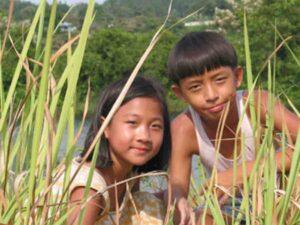A story about friendships, sibling love and life struggles, Jack Neo’s Homerun tugs at your heartstrings in so many ways. Set in 1965, Singapore, the film is a local adaptation of the award-winning 1997 Iranian film, Children of Heaven. It revolves around a pair of siblings, Chew Kiat Kun (Shawn Lee) and his younger sister, Chew Seow Fang (Megan Zheng), who struggle to cope with sharing a pair of shoes after Chew misplaces his sister’s shoes.
Traveling to school becomes a dreaded, almost insurmountable task for the siblings who must take turns to wear the pair of shoes in between classes. Kiat Kun lands himself a punishment and risk of expulsion for constantly running late, while Seow Fang gets lambasted and teased for wearing oversized shoes to school.
More than half a century later, it is almost impossible to place ourselves in the shoes (quite literally) of the siblings whose lives revolve around a pair of shoes, or lack thereof. For the times and world we live in, one might perceive their troubles hard to relate to, even monotonous and insubstantial. The plot may be deceptively simple but if you’re willing to persist, it’s a wildly emotional ride every step of the way. There is no climax per se; rather the film tracks the grueling journey of the Chew siblings, demonstrating their constant tenacity amidst their seemingly trivial endeavors.
Unrelenting Optimism
The camera especially provides close-up shots of Seow Fang who’s not particularly verbally expressive in these moments. It helps establish an intimacy between her and the audience as the camera, guided just by her facial expressions, lets us into her world to discern her troubles.
The ultimate tearjerker comes for me towards the end of the film, with Xu Mei Xian’s ‘Yong You’ (translation: ‘We have everything’) being played as the siblings demonstrate their unwavering determination towards their goals. Neo captures the essence of the plot in those very scenes. Whether it is because of the characters’ difficulties that finally hit home or because their perseverance reminds me of my own life struggles, the ending moves me every single time. In fact, if you don’t understand Mandarin, be sure to check out the translation of lyrics and judge for yourself how the song perfectly encapsulates the crux of the film.
Comparing the rural setting as what many Singaporeans would know as kampongs (villages) with the urban and highly modernized landscape we have today, it is difficult to imagine the level of poverty that has struck all those generations before us. Nonetheless, it inevitably evokes an inexplicable sense of nostalgia in me; perhaps because the element of simplicity provides a refreshing juxtaposition to the modernisation we thrive in today.
Politically symbolic
Homerun is laced with childhood innocence and ostensibly, appears to be less thought-provoking than it actually is. However, delving deeper, one, especially a Singaporean, can unveil the political nuances that underlie the unassuming petty rivalry squabbles or characters’ nicknames.
Though Jack Neo doesn’t explicitly acknowledge it, there must be a reason why the film is set exactly in the year that Singapore gained independence from Malaysia. For starters, one of Kiat Kun’s friends nicknamed ‘Little Red Dot’ alludes to the exact term ‘Little Red Dot’ that the late third Indonesian president B.J. Habibie coined, referring directly to Singapore.
The water dispute between Kiat Kun and Beng Soon (Joshua Ang) over the right to drink and draw water from the well further insinuates the raging water conflicts between Singapore and Malaysia ever since their separation.
Though subtle, the political references require a degree of appreciation. Even the rough and bumpy roads or motif of shards of glass in the film could be metaphors for the obstacles ahead of Singapore’s independence.
At the end of the film, the camera briefly focuses on Kiat Kun and Seow Fang before extending to a wide shot of a long and muddy road ahead of them. As our eyes follow the surroundings when the camera slowly zooms out, that daunting sense of what is in store for a newly independent Singapore almost feels palpable.
Conclusion
If you have watched Children of Heaven before Homerun, you might find that the remake does not have many features that sets it apart from the original.
I however, find that weaving in historical elements that feature our humble beginnings serve as a reminder to the present and future generations to not disregard our roots. It makes the film uniquely ‘us’, an aspect I personally find difficult to sieve out in other local films. The same could not be said for Malaysia, which has banned the film in their country, having not taken too kindly to the political satire.
Homerun is not all desolate and bleak; especially with a rowdy group of boys, one can expect some light-hearted banter and comic relief.
overall, it’s a heartfelt effort that will leave you emotionally satiated. Whether you choose to watch it through political lenses or simply because you feel reminiscent about the past, I highly recommend it!
